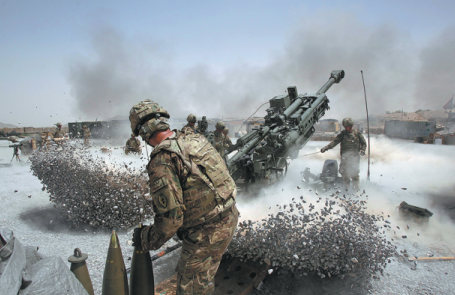Report: US officials lied on Afghanistan
(CHINA DAILY) Updated: 2019-12-11 00:00For nearly two decades, senior US officials didn't tell the truth about the war in Afghanistan, the Washington Post reported on Monday after reviewing more than 2,000 pages of government documents.
The civilian and military officials made pronouncements they knew to be false and hid evidence that the war had become unwinnable, the newspaper said interviews with those officials show.
John Sopko, the head of the federal agency that conducted the interviews, acknowledged to the Post that the documents show "the American people have constantly been lied to".
The newspaper said that two major claims in the documents are that US officials manipulated statistics to suggest to the US public that the war was being won and that successive administrations turned a blind eye to alleged corruption among Afghan officials, allowing the theft of US aid with impunity.
Neither the Pentagon nor past or present civilian officials identified by name in the Post's main story and several accompanying stories commented on the newspaper's report about the 18-year war, which is the longest armed conflict in US history.
The Post published its report, The Afghanistan Papers: A Secret History of America's Longest War, just as peace talks between the United States and the Taliban have restarted in Doha, Qatar.
In an unannounced Thanksgiving visit to US troops in Afghanistan last month, US President Donald Trump declared that he had reopened the peace talks less than three months after scuttling talks in hopes of ending the war.
"The Taliban wants to make a deal, and we're meeting with them," Trump said. "We're going to stay until such time as we have a deal, or we have total victory, and they want to make a deal very badly."
Trump also reaffirmed his desire to reduce the US military presence to 8,600 troops from about 12,000 to 13,000.
Since 2001, more than 775,000 US troops have been deployed to Afghanistan, many repeatedly. Of those, 2,300 died there and 20,589 were wounded in action, according to US Defense Department figures.
The documents obtained by the Post include previously unpublished notes of interviews with people who played a direct role in the war, from generals and diplomats to aid workers and Afghan officials.
The Post said that it won release of the documents after a three-year legal battle with the Special Inspector General for Afghanistan Reconstruction, known as SIGAR, which was created by Congress in 2008 to investigate waste and fraud in the war zone.
The Post described the documents as drawn from interviews conducted between 2014 and 2018 that were used by the inspector general for Afghanistan reconstruction to write a series of unclassified "Lessons Learned".
The $11 million project was meant to diagnose policy failures in Afghanistan so the US wouldn't repeat the mistakes the next time it invaded a country or tried to rebuild a shattered one.
The Lessons Learned staff interviewed more than 600 people with firsthand experience in the war. Most were Americans, but SIGAR analysts also traveled to London, Brussels and Berlin to interview officials with NATO allies. In addition, they interviewed about 20 Afghan officials, discussing reconstruction and development programs.
In the interviews, more than 400 insiders gave unrestrained criticism of what went wrong in Afghanistan and how the US became mired in the war, according to the Post.
Contradicted statements
The documents also contradict public statements from US presidents, military commanders and diplomats who assured the US public year after year that they were making progress in Afghanistan and that the war was worth fighting, the Post said.
"We were devoid of a fundamental understanding of Afghanistan-we didn't know what we were doing," Douglas Lute, a three-star Army general who served as the White House's Afghan war czar during the George W. Bush and Barack Obama administrations, told government interviewers in 2015.
"What are we trying to do here? We didn't have the foggiest notion of what we were undertaking," he said.
With most speaking on the assumption that their remarks wouldn't become public, US officials acknowledged that their war-fighting strategies were fatally flawed, and that Washington wasted enormous sums of money trying to remake Afghanistan into a modern nation, the Post said.
"What did we get for this $1 trillion effort? Was it worth $1 trillion?" Jeffrey Eggers, a retired Navy SEAL and White House staffer for Bush and Obama, told government interviewers. He added: "After the killing of Osama bin Laden, I said that Osama was probably laughing in his watery grave considering how much we have spent on Afghanistan."
Several of those interviewed, the Post said, described explicit and sustained efforts by the US government to deliberately mislead the public. They said it was common at military headquarters in Kabul-and at the White House-to distort statistics to make it appear the US was winning the war when that was not the case.
"Every data point was altered to present the best picture possible," Bob Crowley, an Army colonel who served as a senior counterinsurgency adviser to US military commanders in 2013 and 2014, told government interviewers.
"Surveys, for instance, were totally unreliable but reinforced that everything we were doing was right and we became a self-licking ice cream cone," he said.
The Post also said the interviews show that as the war dragged on, the goals and mission kept changing, and a lack of faith in the US strategy took root inside the Pentagon, the White House and the US State Department.

- 'Cooperation is complementary'
- Worldwide manhunt nets 50th fugitive
- China-Japan meet seeks cooperation
- Agency ensuring natural gas supply
- Global manhunt sees China catch its 50th fugitive
- Call for 'Red Boat Spirit' a noble goal, official says
- China 'open to world' of foreign talent
- Free trade studies agreed on as Li meets with Canadian PM Trudeau
- Emojis on austerity rules from top anti-graft authority go viral
- Xi: All aboard internet express











